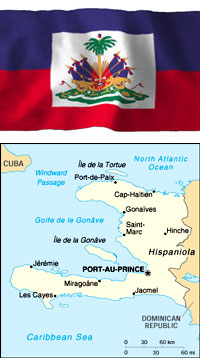UN paying Haitians $5 a day to work
By Saeed Shabazz -Staff Writer- | Last updated: Feb 17, 2010 - 11:41:00 AMWhat's your opinion on this article?

|

|
In response to a reporter's question, Mr. Ryan said while the initial phase of the cash-for-work program entailed short-term employment—with workers holding jobs for about two weeks before positions are rotated to other unemployed persons—it was hoped the program would spawn longer-term social benefits, including vocational training.
Helen Clark, the head of UNDP, told reporters job creation in Haiti is critical to getting families back on their feet, to revitalizing the local economy, and reducing social tension. She said UNDP's aim is to create 220,000 jobs over the next few months.
When Mr. Ryan was asked by a reporter how the program was recruiting for jobs, he said it was working closely with the Haitian government and a host of experienced non-governmental organizations. Working with such community-service organizations would keep the project “grounded in the Haitian reality,” he added.
“The Haitian reality is what the reality always is for oppressed people,” commented Omowale Clay of the Brooklyn-based December 12th Movement. Haitian workers are being told “be grateful” that you got something, he added. “The returns to the Haitian economy are minimal, and the living standards of Haitian people are not going to rise because they are receiving $5 a day for backbreaking work,” Mr. Clay said.
Articles written by Ezili Danto, the pen-name for attorney and activist Marguerite Laurent of the Connecticut-based Haitian Lawyers Network, have complained about “Haiti, Genocide and the New Slavery Model.”
A UNDP spokesperson announced on Feb. 12 that the agency had started out by paying workers directly, but was trying to utilize banks “to create a more reasonable system,” while failing to say who would benefit from such a change. The spokesperson also said there was a proposal on the table to pay a percentage of the daily wage, at least a dollar, in food.
“We must see what is happening to workers in Haiti in the same context as what happens to workers on a global scale,” argued Mr. Clay. Remember the undocumented workers that were brought into the World Trade Center cleanup after 9-11? Mr. Clay asked. “They were paid as cheap labor; they had to clean up all that crap without safety equipment. Who knows what health issues these workers are facing today,” Mr. Clay stressed.
“So,” said Mr. Clay, “Those Haitian workers who are being paid less than $5 a day, think of the working conditions they are facing; and what will be the consequences.”
The consequences will be the continued depopulation of Haiti; and a de-humanizing of Haitian workers, who would rather sit at home and wait for $100 from a family member abroad then be misused by UNDP or USAID, said Ms. Laurent, in an exclusive interview with The Final Call.
“They are recruiting women for many of these jobs, while excluding men; which helps to destroy the Black family in Haiti; and they are only paying enough to barely make ends meet. ‘Take what we are giving you,'” said Ms. Laurent.
“What are U.S. charity workers and the UN staff being paid on a daily basis in Haiti?” asked Ms. Laurent.
“Haitians have a long standing gripe with international governments, donors and some civil society organizations for swooping in and deciding what's best for Haiti, with too little input from Haitians themselves, and too little regard for unintended consequences,” wrote Michele Wacker, executive director of the World Policy Institute.
INSIDE STORIES AND REVIEWS
-
-
About Harriett ... and the Negro Hollywood Road Show
By Rabiah Muhammad, Guest Columnist » Full Story -
Skepticism greets Jay-Z, NFL talk of inspiring change
By Bryan 18X Crawford and Richard B. Muhammad The Final Call Newspaper @TheFinalCall » Full Story -
The painful problem of Black girls and suicide
By Charlene Muhammad -National Correspondent- » Full Story -
Exploitation of Innocence - Report: Perceptions, policies hurting Black girls
By Charlene Muhammad -National Correspondent- » Full Story -
Big Ballin: Big ideas fuel a father’s Big Baller Brand and brash business sense
By Bryan Crawford -Contributing Writer- » Full Story






 Click Here Stay Connected!
Click Here Stay Connected!








